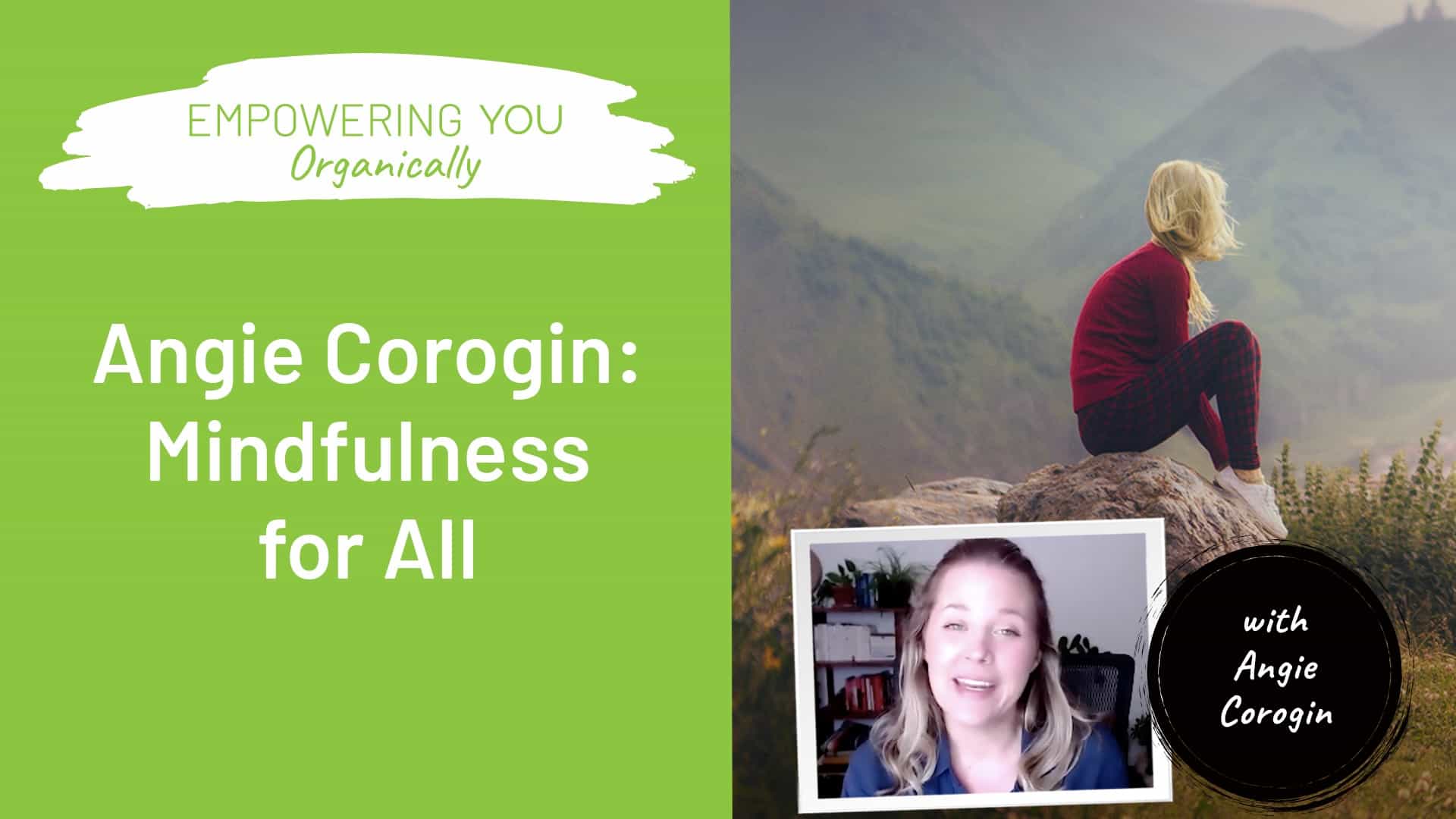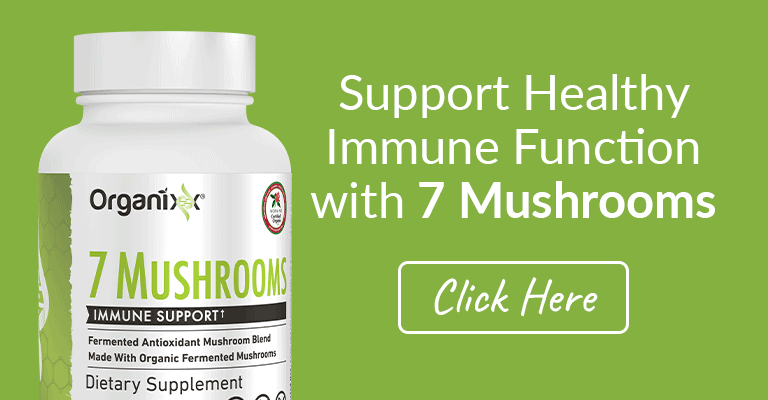Empowering You Organically – Season 12 – Episode 112
Title: Angie Corogin: Mindfulness for All
Guest: Angie Corogin, MEd, ERYT200, RYT500 – Mindfulness Educator & Mindset Coach
Description: Angie Corogin is back this week to help us unlock the power of Mindfulness. Angie shares the difference between Formal and Informal Mindfulness, gives us practical exercises to use, and shares a story that will resonate deeply with all of us! Relaxation here you come…
* * *
FEATURED PRODUCT
This Powerful Anti-Inflammatory Supports a Healthy Heart, Boosts the Thyroid, and Promotes Brain Function
- 3 NATURAL INFLAMMATORY SUPPORT AGENTS:Our revolutionary formula combines Frankincense, Myrrh & organic fermented Turmeric into a powerhouse anti-inflammatory supplement.
- SOOTHE ACHING JOINTS: Each of these ancient treasures has been shown through studies to help alleviate joint pain, soothe aching joints and decrease inflammation.
- INCREASE MEMORY & ALERTNESS:Frankincense has been scientifically demonstrated to support a healthy heart, support normal thyroid function, and promote memory and brain function.
- CLEAN INGREDIENTS:We use only the purest and cleanest ingredients. Our Joint & Muscle Care contains all natural ingredients free from fillers, binders and excipients.
* * *
Angie Corogin
Angie is a heartful yoga and mindfulness (MBSR) instructor, yoga studio owner, mindset coach, and certified integrative wellness consultant. She supports communities, corporations, and individuals to integrate functional wellness practices into their modern lives. Angie is committed to an earth-conscious lifestyle, from what she eats & drinks to all of the things that she consumes and is inspired to share this way of life with others. Angie has earned degrees in Environmental Education (B.S.) and Intervention Services (M.Ed).
Definition of Mindfulness
Mindfulness is awareness that arises through paying attention, on purpose, in the present moment, non-judgmentally, in the service of self-understanding and wisdom.” JKZ
It is holding our attention to whatever is rising. Being here. HumanBEING not humanDOING. This can be hard at first, boring, restless, thinking we aren’t doing it right.
We sense the world through, hearing, tasting, touching, seeing. That is our only way to know anything at all. Our senses inform our thoughts. And this is our perception, from where we form opinions and then make decisions and hold positions. Its a completely a personal experience but one that we can often collectively understand and benefit from sharing our experience with others.
Mindfulness-Based Stress Reduction (MBSR).
The timelines of stress research and mindfulness research start to merge in 1979. Jon Kabat-Zinn recruited chronically ill patients not responding well to traditional treatments to participate in his newly formed eight-week stress-reduction program, which we now call Mindfulness-Based Stress Reduction (MBSR). This program includes mindful meditation, mindful eating, walking, and mindful movement (aka gentle yoga).
Substantial research has mounted demonstrating how mindfulness-based interventions improve mental and physical health—comparably so to other psychological interventions
Our body is a partner to each moment. Here in the west, we spend a lot of time disconnecting from our body. Body shaming, and in fact spending a whole lot of time up here, in the mind, thinking.
And so again, mindfulness – paying attention for the sake of paying attention. We can start to recognize our habitual patterns. Knowing our patterns can really change things.
You can do this practice long, short, in a car, while washing dishes, having a cup of tea, eating a meal, walking, in the shower. Mindfulness can be invited into each and every moment. It’s a practice, not a performance. We just keep coming back to each moment. Giving each moment incredible value, importance and attention.
Simple right, not so easy. A very important aspect of mindfulness is bringing an attitude of kindness to our own self. Right, what’s that? Yes, being kind to ourselves is a thing.
S.T.O.P
The STOP acronym is one of the most well-known and cherished brief mindfulness practices to use during the day. It’s super simple:
S – Stop
T – Take a breath
O – Observe what’s going on
P – Proceed
This can be done any time during the day when you remember. You become aware of what’s going on around you or inside of you, you ground yourself with some conscious breaths, and then you proceed with more clarity and from a place of choice.
Here are three wonderful ways to practice STOP in more depth: The ABCs of STOP—or practicing STOP for Awareness, Beauty, and Compassion:
STOP — A: STOP for awareness
Using the STOP practice to become fully aware of the present moment: What is going on in the body? The mind? The emotional field? Or asking yourself: What is out of my awareness right now? It can be as simple as noticing your brain is foggy after being on a conference call for two hours (and that you need a stretch break) or that you have been thinking about the upcoming teacher meeting all morning. Simply stop and take a breath.
STOP — B: STOP for beauty
Pause for a moment and notice something beautiful in your surroundings. It can literally be to “stop and smell the roses.” Use all of your senses to find something and then take it in for a breath or two. If that feels too big of a stretch you can ask yourself: “Ok, I know this is a stressful moment right now, but if there was something beautiful about it, what would it be?” Maybe then we notice the flowers on the table, which blend into the background when we are busy. Or the beautiful braids of the woman in front of us in the (long!) check out line at the grocery store.
Compassion is a natural, caring response to suffering, big and small, in ourselves and in others.
STOP — C: STOP for compassion
In a moment of stress or pain, practice STOP to open your heart to kindness and compassion. Compassion is a natural, caring response to suffering, big and small, in ourselves and in others. Sometimes the tug of compassion calls us to stop, at other times we need to stop and really take something in, so we can open the doors of the heart and invite compassion in. Maybe we are a little impatient with our child complaining at length about something that happened at recess. Maybe the adult brain doesn’t see it as hurtful but stopping and truly listening might allow us to connect with the truth of her hurt and allow our heart to melt a little.
Breath Focus Practice
Take a moment and find something to let your eyes rest on. Soften your gaze but looking. You might like to rest your hands…. And when it is comfortable begin to let your eye lids lower, any amount or all of the way closed. Feel yourself sitting, standing, know what you can about being right here. Only this moment matters right now. What can be known? Begin to look at the inside of the eyes. Look with awareness. Look to know, to see what’s there.
Move your attention to your breath. You might even feel this ability to look inward at the breath. From any perspective that you can you know the breath. From the nose, the nostrils, the throat, the chest, or ribs moving or belly. You might sense warmth and then cool as your breath enters and leaves.
And then gently open your eyes again. And continue to look with this awareness.
* * *
Subscribe to Empowering You Organically
Never miss an episode!





